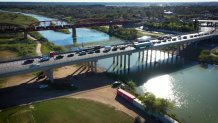The recent arrest of a Mexican railroad worker, accused of helping smuggle people across the border on trains in Eagle Pass, Texas, has raised questions about plans to allow more trains operated by Mexican crews to travel miles into South Texas.
In Eagle Pass, trains have long stopped at the international bridge so that Mexican railroad crews can hand over trains to U.S. workers.
Watch NBC 5 free wherever you are

However, the Union Pacific Railroad has announced that it is finalizing an agreement with U.S. Customs and Border Protection, which would allow crews from Mexico to bring trains seven miles into the United States, through Eagle Pass, and to a railyard where the train would be handed off.
Get top local stories delivered to you every morning with NBC DFW's News Headlines newsletter.
U.S. Customs and Border Protection supports the move, saying it will alleviate concerns about immigrants jumping onto trains stopped on the border. But some U.S. workers see the plan as a threat to American jobs and border security.
“One hundred percent. I think it's opening a back door,” said Mark Wallace, national president of the Brotherhood of Locomotive Engineers and Trainmen, which represents 51,000 American railroad workers.
Wallace believes American train crews are more likely than their Mexican counterparts to report human smuggling to U.S authorities, and the union points to the recent federal arrest of a Mexican railroad worker to underscore its concerns.

U.S. Homeland Security officials said Cesar Ayala Zapata, who they identified as an employee of Mexican railroad company Ferromex, received wire transfers totaling $11,460 in exchange for instructing groups of undocumented people on "…how to conceal themselves in the railcar to avoid X-ray detection," according to a federal criminal complaint.
NBC 5 Investigates
Uncover. Reveal. Expose.
Court records show that Ayala waived his right to a preliminary hearing and is being held without bond. An attorney appointed to represent Ayala did not immediately respond to questions from NBC 5 Investigates. A spokesperson for Grupo Mexico, the Mexican parent company of Ferromex, said the company had no information about the arrest and did not respond to questions from NBC 5 Investigates about the use of Mexican crews in South Texas.
Some U.S. railroad union officials believe human smugglers will be even more interested in using trains that don’t stop until they are much further into the United States.

However, U.S. Customs and Border Protection told NBC 5 Investigates that it backs plans for Mexican crews to travel seven miles north of the border at Eagle Pass. The agency believes moving the crew change location deeper into South Texas will reduce the number of immigrants using trains to cross the border illegally.
In a statement, a U.S. Customs and Border Protection spokesperson told NBC 5 Investigates when trains stop at the international bridge, it "...creates a time stoppage that actually increases the opportunity for aliens to illegally board the train. A train at rest is a train at risk."
The Union Pacific plan to shift the crew change location north of the border is not a new concept and is already happening on other routes.

A Union Pacific spokesperson told NBC 5 Investigates, "This mirrors the longstanding practice between U.S. and Mexican carriers in Laredo, Texas, and at the Canadian border where the process enhances border security and crew safety..."
The railroad said it is now finalizing agreements with Ferromex and U.S. Customs and Border Protection to move the Eagle Pass handoff location.
A Federal Railroad Administration spokesperson said the agency is aware of seven routes where Mexican crews operate trains in the U.S. along the border region in Texas, Arizona and California.
For years, U.S. railroads have advocated for increased use of Mexican crews to move trains in the U.S. border region, saying it helps streamline operations and reduces threats to valuable cargo.

“Enabling certified Mexican crews to operate trains between secure rail yards on either side of the border reduces the risk of theft, vandalism, and trespassing, while also enhancing safety and minimizing the time trains occupy streets and highways in border communities. Importantly, these staffing changes in other locations have not resulted in job losses or reduced hours for U.S. rail workers. In fact, the increased capacity has created new train slots and generated additional U.S. jobs,” said Jessica Kahanek, a spokesperson for the Association of American Railroads, an industry organization that advocates on behalf of freight carriers.
Union officials disagree and believe that allowing more Mexican crews to work north of the border poses a significant risk to American jobs. They also question why the Trump Administration recently signed an order requiring commercial truck drivers operating in the U.S. to speak English, while allowing non-English speaking crews to operate trains.
“Our ask would be that they apply the same executive order to the rail industry and require that only American citizens operate trains within the United States,” said Wallace, the rail workers' union president.
The Federal Railroad Administration told NBC 5 that even though U.S. rules don't require English-speaking train crews, railroads provide translators on board to ensure crews can communicate effectively. Union Pacific said it also has a bilingual dispatch center at Eagle Pass and that American crews will still process trains once they arrive at a rail yard north of the border, just as they have at the international bridge.

Union Pacific and the Federal Railroad Administration said all crews will be trained to meet U.S. safety standards and that there are no plans to expand the use of Mexican crews beyond the immediate border region.
But BLET union officials still believe the expansion of Mexican crew operations is a slippery slope. They worry that the use of foreign workers might someday grow far beyond the border region.
“If there's one industry that's built America, it's the railroad industry, and so we expect that our jobs be protected in the United States from Mexican nationals coming in and performing our work,” said Wallace.



